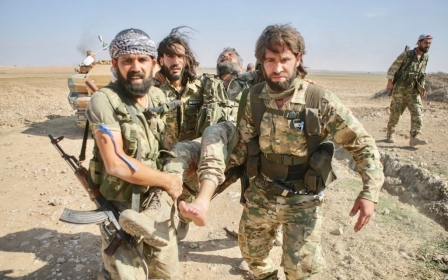Iranian press review: Turkey’s Syria offensive lands Iranian footballers in hot water

Two Iranian footballers have landed in hot water after sharing content on social media related to Turkey’s military operation in Syria.
Iran’s football federation has suspended Mehdi Babri of Tractor Sazi, a team from the East Azerbaijan province, after he published an image of Turkey’s flag and army on Instagram.
Babri deleted the post after a few hours, but his action led to him being suspended from participating in professional football activities until a decision is made on his case.
The footballer’s post comes after Turkey launched an offensive in northern Syria last week against Kurdish fighters whom Ankara considers a threat to its national security.
Babri and most of the population in the Iranian provinces of East and West Azerbaijan and Ardabil are ethnically Turk.
Stay informed with MEE's newsletters
Sign up to get the latest alerts, insights and analysis, starting with Turkey Unpacked
An Iranian Kurd footballer, Sirvan Ghorbani of Sanate Naft club, also received a suspension after he responded to Babri’s Instagram post with coarse insults. Ghorbani’s comment was also later deleted.
In a statement by Iran’s football federation, the governmental body asked all professional football players to “only make comments about their own professional field of activity”.
The Iranian government and Kurdish activists have condemned Turkey’s current military operation in northern Syria. However, many Pan-Turkists living in western Iran feel an affinity to authorities in neighbouring Turkey.
Iran is a close ally of Syrian President Bashar al-Assad and has regularly urged other foreign military forces to leave Syria.
First all-women pilot crew makes Iranian history
On Monday, a female captain and female first officer became the first women-only team to fly a passenger plane in Iran’s aviation history.
Neshat Jahandari, who works for Iranian Zagros Airlines, and her co-pilot Forouz Firouzi made the Tehran-Mashhad roundtrip on a twin-engine MD-80 jet, with 160 passengers on board on the way to Mashhad and 171 passengers on the way back to Tehran.
Jahandari, widely known in Iran for her popular Instagram account where she regularly posts about her aviation activities, is only the second Iranian female pilot working for domestic airlines.
Shahrzad Shams was the first female pilot in Iran to fly passenger flights in 2012.
News of the historic journey immediately went viral on Farsi social media, and a day later an image of the two pilots in the cockpit appeared on the front page of some national dailies. Shahrvand daily published the photo on its front page along with the headline: “Women control the yoke of the sky”.
The daily also interviewed the head of Iran’s aviation organisation and quoted him as saying: “Many women are now being trained in different aviation centres and in a short time, they will be ready to fly. Very soon the presence of women in the cockpits will not be a surprise at all.”
Rich Iranians head to Gulf for yacht parties
Wealthy Iranians spend thousands of dollars on renting and buying luxury yachts in the Gulf amid rising tensions between Iran and the US, while at home many Iranians are feeling the wrath of US sanctions, Aftab Yazd daily reports.
According to the daily, a new trend has been emerging among the rich to throw birthday, marriage and private parties on yachts harbouring at Kish Island off the southern coast of Iran and sailing in the Gulf. Some agencies have started to offer charter flights from various cities to the island for the parties.
The cost to rent a yacht depends on the number of guests and the timing. However, Aftab Yazd suggests that a 10-hour party with 100 guests on one of these luxury vessels will run about 900 million Iranian rials (about $7,500).
Meanwhile, there has been a sharp rise in the number of yacht purchases. The starting price for these vessels in Iran is 2.5 billion rials (about $21,000), and the buyer receives the ship in less than three months at any desired Iranian port in the Gulf, Sea of Oman or the Caspian Sea.
As the Iranian currency weakens due to US sanctions following President Donald Trump’s 2018 withdrawal from the nuclear deal, well-connected Iranian businesspeople using foreign currencies are now strengthening a new upper class in the sanction-hit country.
Corruption in higher education
Government scholarships awarded to the children of Iran’s ruling elite or members of the Iranian militia Basij have sparked controversy in the country.
According to Iran daily, these funds were made available to a select few during former President Mahmoud Ahmadinejad’s administration.
Last week in a speech to parliament, Iranian legislator Mahmoud Sadeghi revealed that he had obtained a list of names who had received government scholarships without meeting the necessary criteria.
“On this list there are names of MPs, the children of the MPs, Friday prayer imams, police chiefs and ministers,” Sadeghi was quoted as saying.
Meanwhile, Iran’s Higher Education Ministry has announced that 800 applicants who had received government scholarships between 2006 and 2013 were not eligible for the funds.
In another scandal case related to higher education, the Arman daily reported that 211 medicine students were accepted in public universities without passing the national entrance exam, Konkour.
The daily did not indicate when these students entered the universities, however, it reported that “a seat at public medicine schools has been traded between four to five billion Iranian rials ($33,000 to $42,000)”.
*Iranian press review is a digest of reports that are not independently verified as accurate by Middle East Eye.
Middle East Eye delivers independent and unrivalled coverage and analysis of the Middle East, North Africa and beyond. To learn more about republishing this content and the associated fees, please fill out this form. More about MEE can be found here.




